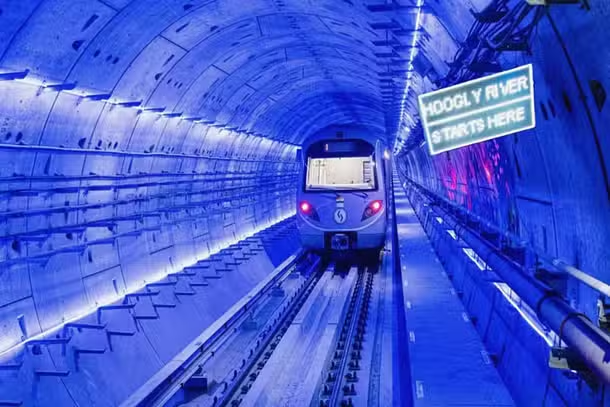Kolkata Metro is poised to implement an innovative Battery Energy Storage System (BESS) within its underground segment, aimed at enhancing passenger safety and optimizing energy efficiency.
This pioneering technology is to ensure uninterrupted operations during power outages, thereby designed to minimize inconvenience for commuters. The integration of this system will render Metro services more dependable, energy-efficient, and environmentally sustainable.
The Necessity of a Power Backup System for Kolkata Metro
Power interruptions can lead to significant disruptions in metro operations, potentially leaving passengers in darkened tunnels.
The deployment of the BESS at the Central Station substation represents a proactive initiative to mitigate such hazards.
This power backup mechanism will guarantee that, even in the event of a total grid failure, trains can operate at a speed of 30 km/h, safely transporting passengers to the nearest station.
Understanding the Technology of the Battery Energy Storage System
The ESS consists of a combination of inverters and advanced chemistry cell (ACC) batteries. This system has been meticulously engineered to deliver 4 MW of power from a specific location, ensuring a consistent energy supply to all stations along the North-South Corridor.
With the implementation of this technology, passenger safety will be greatly enhanced, and metro services will maintain uninterrupted operations.
The Influence of Kolkata Metro’s Underground Segment
Focus on the Key Underground Segment
The power backup system is set to be introduced along the Kolkata Metro Blue Line corridor, which encompasses a 16 km underground section from Tollygunge to Dumdum.
This segment is among the most heavily trafficked, underscoring the necessity for a reliable power supply. The implementation of this new system will ensure that passengers can travel securely, even in emergency situations.
Mitigating Passenger Disruptions
A primary benefit of the Battery Energy Storage System (BESS) is its ability to prevent passengers from being trapped in tunnels during unexpected power outages.
Rather than halting operations, trains will have adequate backup power to continue to the nearest station, thereby facilitating a seamless commuting experience for the thousands who rely on this service each day.
Sustainable and Economically Viable Innovation
Enhancing Energy Efficiency and Sustainability
In addition to bolstering safety, the BESS will play a vital role in energy management. It will serve as a power reserve during nighttime, storing energy for utilization during peak demand periods.
This approach will minimize energy waste and enhance power efficiency throughout the metro network.

Financial Advantages and Cost Reductions
This environmentally friendly initiative is anticipated to lead to substantial reductions in the Kolkata Metro’s energy expenditures.
By effectively managing power demand during peak hours, metro authorities project potential savings of up to Rs 7 crore over the lifespan of the system.
Such economic advantages render this project extremely beneficial for the future of urban transportation in the city.
Future Expansion Plans
The Railway Board has allocated funds for the implementation of this system, and following the operational launch of the first unit in May, metro authorities intend to deploy seven additional Battery Energy Storage System (BESS) units. Each unit will possess a capacity of 1 MW.
The integration of the Traction Energy Storage System (TESS) will provide upgraded power backup services to new substations, thereby reinforcing the metro’s infrastructure.
An essential feature of the BESS is its contribution to fire safety. In the event of an emergency, it will act as an immediate power source, facilitating critical functions such as tunnel ventilation, track exhaust, and platform ventilation.
This enhancement will significantly improve the overall safety of metro operations.
Expert Editorial Comment
The deployment of the BESS represents a major technological leap for Kolkata Metro. This system will not only guarantee continuous metro services but also promote energy efficiency, reduce costs, and bolster emergency readiness.
With the initial phase anticipated to be operational shortly, this initiative establishes a new standard for metro safety and sustainability.

